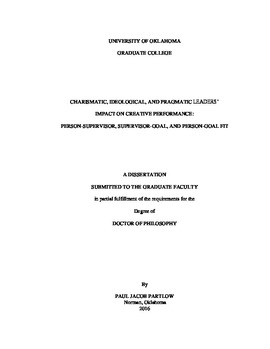| dc.description.abstract | Research examining the compatibility between people and their work environment has been prevalent in the work behavior literature. Despite its rich history, questions remain as to the factors influencing, and the outcomes of, the fit between subordinates, supervisors, and goals. In the present effort, undergraduates completed a creative problem-solving task with the resulting plans being appraised for quality, originality, elegance, affective reaction, and specificity. Three manipulations were used: 1) task instructions framed in the style of a charismatic, ideological, or pragmatic (CIP) leader, 2) presentation of a creativity or performance goal, and 3) description of a crisis or non-crisis situation. Moreover, participants’ CIP leadership style preference was measured. It was found that certain pairings of leadership style, followers’ leader preference, goal type and crisis situation influenced creative problem-solving performance. The implications of these observations for understanding CIP leadership as well as person-supervisor, supervisor-goal, and person-goal fit are discussed. | en_US |
